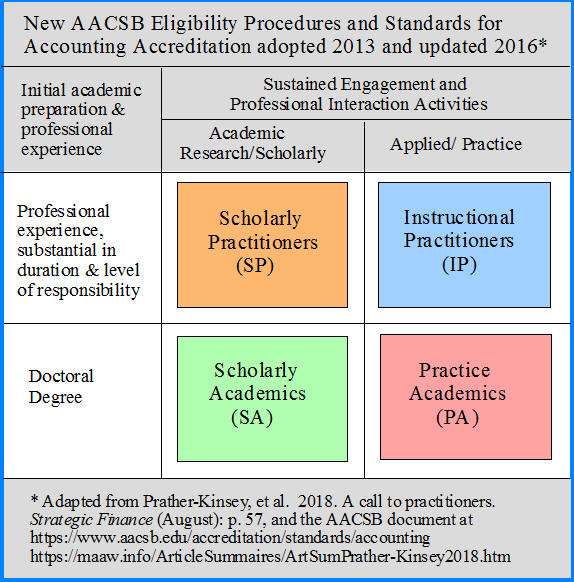
Summary by James R. Martin, Ph.D., CMA
Professor Emeritus, University of South Florida
Advice for Ph.D. Students and New Faculty |
Education Issues Main Page
The purpose of this paper is to briefly describe the new AACSB eligibility procedures and standards for accounting accreditation, and to provide some survey results related to how these changes will affect the mix of academic and practitioner faculty.
How the Standards have Changed
There are three substantive changes in the new AACSB standards.
1. The word "practitioner" has been included in the new faculty categories. While the old standards included only two categories of faculty (Academically qualified, and Professionally qualified), the new standards include four categories (Scholarly practitioners, Instructional practitioners, Scholarly academics, and Practice academics).

2. A larger percentage of faculty who do not have a doctorate can become "qualified faculty". The old standard required at least 50 percent of the faculty to be academically qualified (i.e., have a Ph.D., or equivalent). The new standard allows for up to 60% of the faculty to be practitioners (Scholarly practitioners, Instructional practitioners, or Practice academics).
3. The new standards recognize the value of practice related engagements such as consulting, internships, sustained professional work, participation in professional business associations, service on boards of directors, and participation in conferences, workshops or similar activities.
How each Faculty Category Sustains Currency and Relevance
Scholarly Academics (SA) - Research doctoral degree plus Scholarship and related activities, i.e., ongoing, sustained, and substantive academic and/or professional engagement activities. Normally at least 40% of faculty are scholarly academics (SA).
Practice Academics (PA) - Research doctoral degree plus professional engagement, interaction and relevant activities, i.e., ongoing, sustained, and substantive academic and/or professional engagement activities. Some of the acceptable activities are mentioned in item 3 above. Those with a graduate degree in law will be considered to teach business law.
Scholarly Practitioners (SP) - Master's degree in the discipline related to their field of teaching, relevant scholarship outcomes, editorships, service on boards or committees, leadership positions in academic societies, invited presentations etc.
Instructional Practitioners (IP) - Master's degree in the discipline related to their field of teaching, consulting activities, presentation of continuing professional education activities or executive programs, professional work, service on boards or directors, etc.
Note: The AACSB standard provides guidance only. Each academic unit must develop specific policies related to how qualification status is granted and maintained.
Gauging the Effect
The authors sent surveys to 10,472 active deans, chairs and faculty members that involved three scenarios and three related questions. The results are based on 1,150 usable responses. The first case resulted in a question of whether two practitioners' contributions will be more highly recognized and respected than before the new standard. On a Likert scale of 1 strongly agree and 5 strongly disagree, the mean response was 3.5. The second question was Whether practice focused research will become more important at a nondoctoral granting school. The mean response was 3.05 on the 5 point Likert scale. A similar question at another nondoctoral granting institution was, Do you believe that the change in AACSB standards will enhance the recognition and reward of nontenure-track faculty? The mean response to this question was 2.32.
What it Means
The AACSB has indicated that a more balanced faculty mix including more practice oriented faculty will benefit accounting students. As a result, financial professionals have a better chance to teach and contribute at AACSB accredited institutions. How much better? I believe a lot more research is needed on this issue before we will know the answer to this question.
___________________________________________
Related summaries:
Bennis, W. G. and J. O'Toole. 2005. How business schools lost their way: Too focused on "scientific" research, business schools are hiring professors with limited real-world experience and graduating students who are ill equipped to wrangle with complex, unquantifiable issues - in other words, the stuff of management. Harvard Business Review (May): 96-104. (Summary).
Beyer, B., D. Herrmann, G. K. Meek and E. T. Rapley. 2010. What it means to be an accounting professor: A concise career guide for doctoral students in accounting. Issues in Accounting Education (May): 227-244. (Summary).
Boyle, D. M., B. W. Carpenter, D. R. Hermanson and M. O. Mensah. 2013. The accounting doctorate shortage: Opportunities for practitioners. Strategic Finance (May): 30-36. (Note).
Gary, R. F., C. A. Denison and M. L. Bouillon. 2011. Can obtaining an accounting Ph.D. provide a positive financial return? Issues in Accounting Education (February): 23-38. (Summary).
Grasso, L. 2008. The accounting Ph.D. shortage: Crisis or opportunity? Cost Management (March/April): 15-25. (Note).
Leslie, D. W. 2008. Accounting Faculty in U.S. Colleges and Universities: Status and Trends, 1993-2004. A Report of the American Accounting Association. American Accounting Association. (Note).
Martin, J. R. Not dated. Notes to those considering an Accounting Ph.D. Management And Accounting Web. (Notes for Accounting PhD Students).
Martin, J. R. Not dated. AACSB International Salary Survey Reports: Executive Summary. AACSB. Management And Accounting Web. (AACSB Salary Reports).
Martin, J. R. Not dated. The accounting doctoral shortage and opportunities to teach accounting. Management And Accounting Web. (Accounting Doctoral Shortage).
McNair, C. J. and B. Richards. 2008. Unintended consequences: Death of the teacher-scholar. Cost Management (January/February): 21-28. (Summary).
Meyer, M. J. and P. L. Titard. 2000. Those who can ... teach. Want to exchange your Palm Pilot for a blackboard, get a PhD and go back to college as a teacher? The time to do it is now. Journal of Accountancy. (July): 49-58. (Note).
Trapnell, J. E., N. Mero, J. R. Williams and G. W. Krull, Jr. 2009. The accounting doctoral shortage: Time for a new model. Issues in Accounting Education (November): 427-432. (Note).